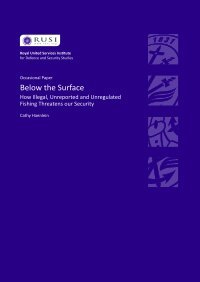Below the Surface: How Illegal, Unreported and Unregulated Fishing Threatens our Security
By Cathy Haenlein.
This paper argues that large-scale illegal, unreported and unregulated (IUU) fishing takes place on an organised, systematic scale across multiple jurisdictions, and must therefore be recognised as transnational organised crime. Such IUU fishing endangers food security, threatens livelihoods, undermines the rule of law and deprives states of revenues. It also intersects with other crimes, further amplifying the threat to security. Illegal, unreported and unregulated (IUU) fishing is conventionally treated by governments worldwide as the result of technical regulatory infringements. As such, it is often deemed a matter for industry regulators and dismissed as a trivial issue insofar as it relates to national security. This diagnosis is flawed. Certainly, IUU fishing is often small in scale and conducted by artisanal fishers out of ignorance of laws, or opportunism. Yet there is also evidence that much of today’s IUU fishing activity takes place on an organised, systematic scale across multiple jurisdictions. Testament to this are the volumes involved. Although numerous difficulties affect such calculations, global losses to IUU fishing have been estimated at some $10–23.5 billion annually – equivalent to 11–26 million tonnes of fish per year. The result is the plunder of the world’s oceans, threatening not only marine ecosystems, but also the security of human populations. Large-scale IUU fishing endangers food security, threatens livelihoods, undermines the rule of law and deprives states of revenues. It also intersects with other crimes, further amplifying the threat to security. Yet research on these security dimensions is limited and fragmented; our understanding of their dynamics remains partial. Policy and practical responses, meanwhile, remain ill-suited, failing to keep pace with the complexity of the threat posed.
London: Royal United Services Institute (RUSI), 2019. 56p.


